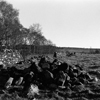Christina Carter, "Texas Blues Working"
 This album somehow earned a reputation for being one of Christina Carter's best despite being limited to a cassette-only edition of just 200 copies. Released during a fertile 2008 that also saw the release of Original Darkness on Kranky, and initially mistitled Texas Working Blues, this Blackest Rainbow re-release shines the spotlight on one of Christina's most direct, layered, and memorable albums.
This album somehow earned a reputation for being one of Christina Carter's best despite being limited to a cassette-only edition of just 200 copies. Released during a fertile 2008 that also saw the release of Original Darkness on Kranky, and initially mistitled Texas Working Blues, this Blackest Rainbow re-release shines the spotlight on one of Christina's most direct, layered, and memorable albums.
Take a look at the album descriptions that Christina has posted at her Many Breaths website. She describes her music in terms of concepts, exorcisms, words, realms, and memories, and only rarely uses the word "song" in a traditional way. When I wrote about Carter's Lace Heart back in September 2009, I said, "For Christina, songwriting is obviously more important than anything else," but after listening to more of her discography, I've discovered that's actually the exception, not the rule. More often than not, Christina prefers ideas to songwriting, and therefore gladly sacrifices accessibility to the bigger picture. I think that's one reason Electrice was so misunderstood, and it goes a long way in explaining why Texas Blues Working is so loved.
Christina's songwriting is exceptionally strong on this album. At first glance she appears to have abandoned her conceptual work for something a little more conventional. Unlike Masque Femine or A Blossom Fell, Texas is populated with familiar structures and strategies. There are chorus-like repetitions, strongly stated lyrics, virtuosic guitar solos, and big, muscular chords that echo with rhythmic urgency. These conventions make the music sound more communal and create a feeling of intimacy with Carter; instead of being driven by opaque personal references and conceptual schematics, Texas Blues Working moves under the impetus of familiar song-craft and plainly stated feelings.
Her songwriting is far from typical, of course. Carter prefers long, raga-like passages to simple chord progressions, and she's more likely to solo for five or six minutes than strum a simple three-chord melody, but she refrains from total improvisation, preferring a middle ground where hummable melodies are repeated with slight variations. "The Outer Planet" is a superb example of this strategy, but it's put to good use on "Bird's Nest" as well. In both cases, Carter layers an extended solo over a quiet bed of repeated chords, but close listening reveals that those solos are actually constantly evolving arabesques built from the melodic statement that opens each song. As these statements shift and transform, they sometimes merge with Christina's vocals, so that there's always a familiar melody playing even if there aren't very many pure repetitions happening.
Carter doesn't sever her connection to the realm of ideas entirely, however. It's probably no accident that the best song on Texas happens to be the one that brings her conceptual side most into the light. "Preserve Our Face" makes explicit what the other songs stated only implicitly: that, on this record, Christina is preoccupied with the ideas of repetition and authenticity just as much as she is with writing great songs. She sings,
"There are infinite people to be
infinite combinations of emotions to sing
and I don’t only want to be myself
but I only want to be myself
and I want to use my voice for good
however small the voice
however small the good in this world of foolish dream."
As she struggles with intentions and the temptation to indulge different personalities, she squeezes a taut, absolutely electrifying solo from her guitar, successfully manifesting the tension of her lyrics in the dusty hum of her strings. It's a superbly crafted song that marries two of her many sides in an almost perfect union.
On "Dinner Plate of Dust," which originally closed the album, Christina achieves a more intense anxiety by rending her melodies apart and disguising her rhythms with more spacious sounds and plenty of reverb. There's also a writhing guitar solo squirming around in the background the entire time; it's unsettling to say the least, and all the more uncomfortable because it comes at the end of such a pretty record. I suppose that an album titled Texas Blues Working could not end with Ms. Carter coming out of the blues happily, and if the record were to end here it would be a superb, if pessimistic, conclusion. Unfortunately, it was decided that an additional song, titled "Lady Friend," should be tacked onto the end as a bonus. Besides being the weakest song of the lot, "Lady Friend" sounds completely out of place. It's not even from the same sessions that spawned Texas Blues Working, but thankfully its sequestered to side D, where it stands alone. Anyone listening to the record can simply refrain from turning it over if they want to avoid hearing it.
Texas Blues Working is almost completely out of print at this point. A few distributors list it as in-stock, but it'll probably cost American readers close to $40 after shipping. Of course, the music is well worth it, but for those who don't want to spend the money, Blackest Rainbow is issuing a CD version sometime very soon.
samples:
 



